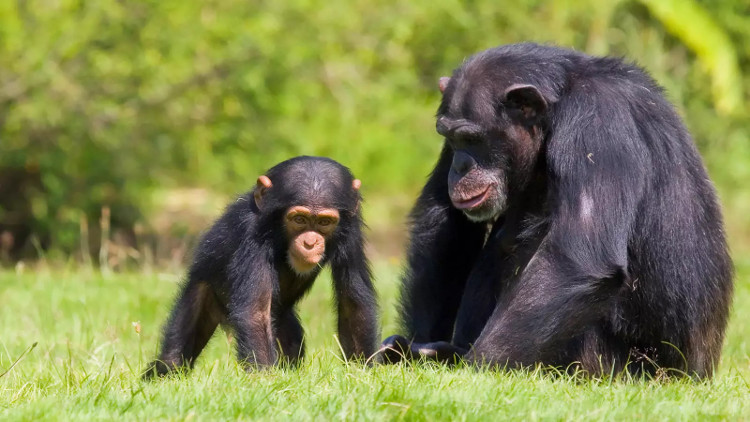Science explains the difference between humans and animals
We often assume that humans are the highest entity, or at least separate, from all animals on the planet. But the reality is that every animal is special and humans are no exception. So why do humans dominate animals? By scientific arguments, Professor of Psychology Thomas Suddendorf of the University of Queensland (Australia) has clarified this problem, through his latest book entitled "The Gap: The Science of What Separates Us From Other Animals "(roughly translated: Science of Difference between Humans and Animals).
What are the physical differences that distinguish people from the closest " relatives " ? According to Professor Suddendorf, who is also a scholar of the Psychological Science Association - an international organization, our bodies differ from those of gibbons and chimpanzees.
Accordingly, people can straighten their knees, have longer legs than their hands, especially the ability to stand upright, to help release their hands to do other things, not to support the body like gibbons and sperms. fine. On the face, fangs in humans are degraded but there are more parts called chin . Particularly, human eyes are relatively small and surrounded by white rings, making it easier for us to identify other people's eyes In addition, the human body covered by sweat glands acts as a more effective cooling system than other primates.

Chimp is a species that has nearly 99% DNA similar to humans.(Photo: Getty Image)
The above physical difference makes no breakthrough compared to birds evolving wings to adapt to life. So people think that the reason we dominate the planet is because there's a bigger brain.
Is humanity the largest brain? The answer is no. Our brain averages from 1.25 to 1.45kg, while the elephant's brain weighs 4kg and the whale brain weighs about 9kg. In terms of proportions, the human brain accounts for 2% of body weight (though consuming up to 25% of energy), while the brains of elephants and whales account for less than 1% of body weight. However, if relying on relative brain size (proportion of brain to body weight) to assess humans superior to animals is also incorrect, because shrews and mice have relatively larger brain sizes than they are me. This proves that brain size is not decided.
So what are the differences that allow us to become creatures that master Earth? In the book, Professor Suddendorf said he conducted a review of the most popular proposals that show that we excel over animals, including: language, predictability, intuition and intellect, culture and religion. virtue. Although many animals, especially those with our relatives, also have some special abilities in these areas, but he sees the ability of humans to be more special when considered in each. context and on some aspects.
More specifically, there are two very important features in people: the desire to exchange mutual thoughts and the ability to consider and choose between the most beneficial situations . On the other hand, people rely on flexible methods to control behavior through smart thinking. We have both the ability to recall and imagine, consider what happened or predict future developments, thereby finding the most optimal way, making us more advantageous than those Other organisms are poor in predictability.
But why are only human beings dominating the world?
If these features are so useful, you may wonder why other organisms do not grow as humans. According to the author, the difference between humans and other creatures before was not so far away as it is today. For example, 40,000 years ago, we shared this planet with a variety of intelligent prehistoric people, straight-forward and know how to use stone tools such as Neanderthal, Denisovan and dwarfs in Flore Island (Indonesia). . But special authority does not originate from muscle, but comes from the collective and intellectual spirit, including the development of linguistic and intellectual survival, which helps people survive and evolve. While other animals often face the risk of perdition (part of our ancestors), people still grow, create civilization and technologies that rely on it, we have each other changes the face of the Earth.
- What would happen if humans were ... 'cold-blooded animals'?
- Animals also know how to heal themselves like humans
- 15 cute animals but you have to stay away
- Are corals more complex than humans?
- 10 most dangerous animals on the planet
- Radon: The invisible danger
- Should we humans eat meat?
- Animals like humans
- Animals look at objects that look like humans?
- The discovery explains why people are more susceptible to neurological diseases than other species
- 10 animals that live the longest in the earth
- 10 animals make humans extinct if revived
 'Fine laughs' - Scary and painful torture in ancient times
'Fine laughs' - Scary and painful torture in ancient times The sequence of numbers 142857 of the Egyptian pyramids is known as the strangest number in the world - Why?
The sequence of numbers 142857 of the Egyptian pyramids is known as the strangest number in the world - Why? History of the iron
History of the iron What is alum?
What is alum?